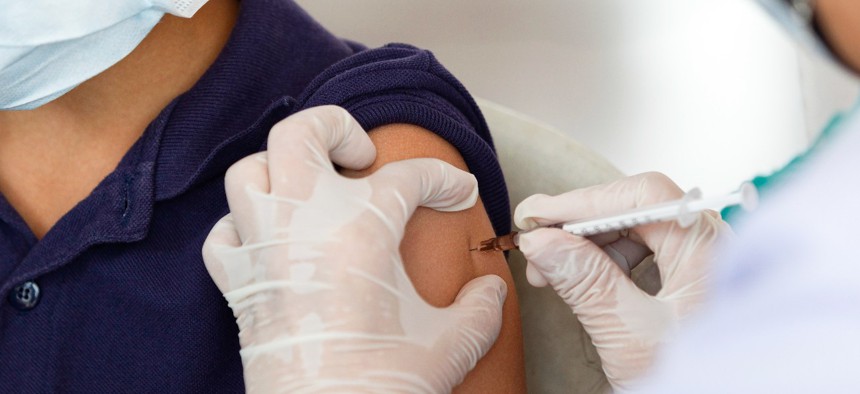
The FDA authorized the bivalent booster shot for kids as young as 6-months old. SOPA Images / Contributor Getty Images
Coronavirus Roundup: Updated Boosters for Youngsters and More Time to Get Your Real ID
There’s a lot to keep track of. Here’s a list of this week’s news updates and stories you may have missed.
The Homeland Security Department has once again extended the deadline for REAL ID enforcement, moving it from May 2023 to May 2025. This extension is due, in part, to the remaining effects from the pandemic on the ability to get a REAL ID driver’s license or identification card.
“DHS REAL ID progress over the past two years has been significantly hindered by state driver’s licensing agencies having to work through the backlogs created by the pandemic,” DHS stated on December 5 in a press release. “Many of these agencies took various steps in response to the pandemic including automatically extending the expiration dates of driver’s licenses and identification cards and shifting operations to appointment only.”
Congress passed the REAL ID Act in 2005, following a recommendation from the 9/11 Commission, which established minimum security standards for driver’s licenses and identification cards. Now, under a new regulation, people 18 and up will need a REAL ID compliant card for domestic air travel. Here are some of the other recent headlines you might have missed.
The Democrats on the House Select Subcommittee on the Coronavirus Crisis released their final report on Friday, summarizing their findings on the Trump administration's mismanagement of the pandemic response, including the "unprecedented campaign to control and even manipulate the work of scientists leading the public health response." The panel noted that President Biden, upon coming into office, worked to restore "trust in the federal government by using a science-driven approach to lead the nation’s pandemic response—a sharp contrast to the Trump administration’s pattern of allowing political considerations to overrule and obstruct the work of career scientists," among other changes. The report includes 30 recommendations for reform. The panel will host its final hearing and business meeting next Wednesday.
Sen. Gary Peters, D-Mich., chairman of the Senate Homeland Security and Governmental Affairs Committee, released a 242-page report on Thursday saying “long term systemic failures left our nation unprepared” to handle the pandemic. The report also detailed failures in the federal government’s early response to COVID-19. The report includes 17 recommendations on pandemic preparedness and response.
In a report issued this week, the Labor Department’s watchdog recommended that Congress extend the statute of limitations for pandemic related unemployment fraud cases. “Currently, the statute of limitations for many of the OIG’s pandemic-related [unemployment insurance] fraud investigations will expire in 2025 as the statutes most often used to prosecute [unemployment] fraud have a 5-year limitation,” said the report. An extension “would help ensure many groups and individuals that have targeted the program do not escape justice.”
On Thursday, the Food and Drug Administration authorized the updated bivalent shot for children as young as 6-months old. “As this virus has changed, and immunity from previous COVID-19 vaccination wanes, the more people who keep up to date on COVID-19 vaccinations, the more benefit there will be for individuals, families and public health by helping prevent severe illnesses, hospitalizations, and deaths,” FDA Commissioner Dr. Robert Califf said in a statement.
On Wednesday, the Occupational Safety and Health Administration moved its much-anticipated permanent COVID-19 standard for health care settings to the Office of Information and Regulatory Affairs for Review, following the lapse of the temporary one. “This pandemic is not over and all exposed workers need protection, not just those who work in health care settings,” said Jessica Martinez, co-executive director of the National Council for Occupational Safety and Health. “That said, it’s an important step forward to provide protections against the spread of COVID-19 and other infectious diseases for millions of health care workers who have risked their lives to take care of the rest of us during this pandemic.” She urged the Office of Management and Budget, which houses OIRA, to “immediately and urgently review this proposed standard, with worker protection as the top priority.”
Help us understand the situation better. Are you a federal employee, contractor or military member with information, concerns, etc. about how your agency is handling the coronavirus? Email us at newstips@govexec.com.







